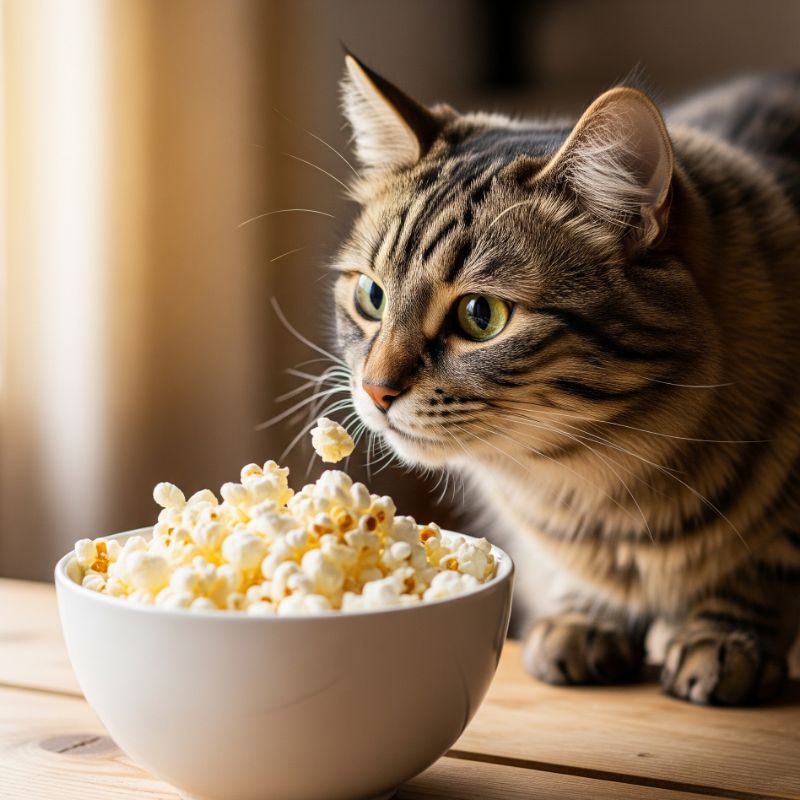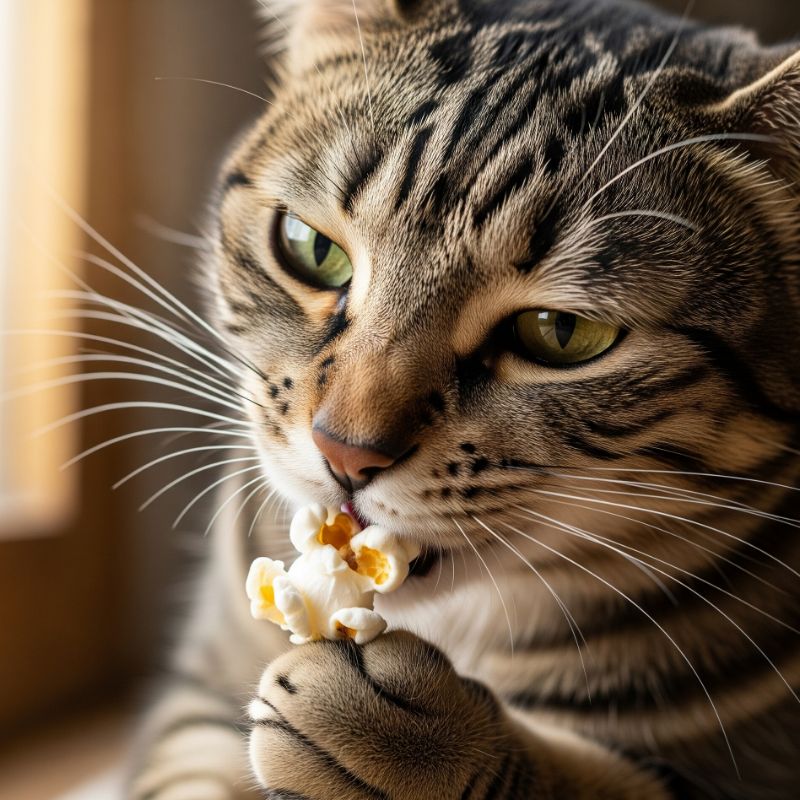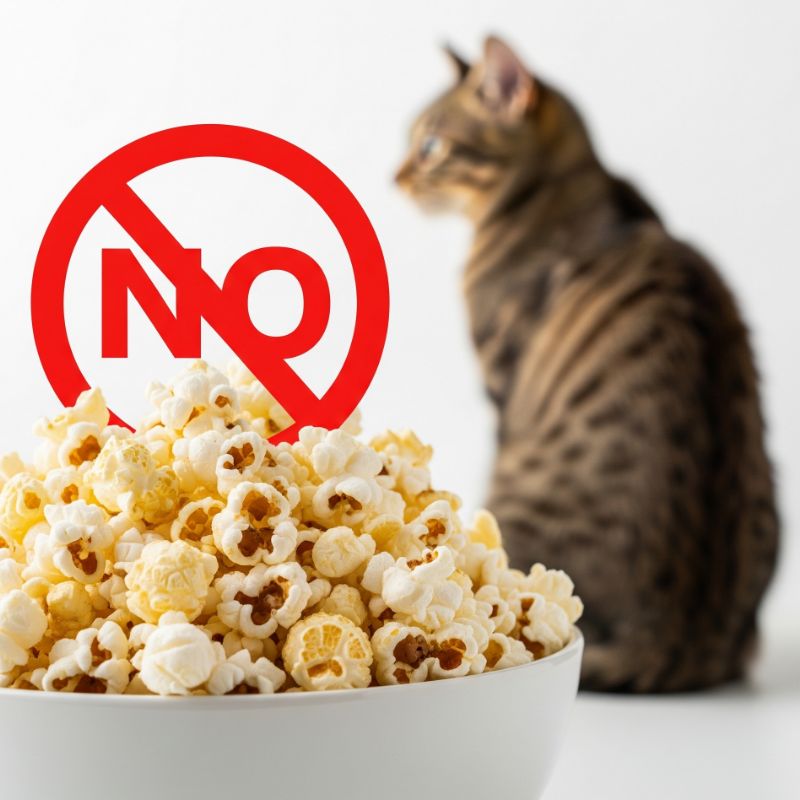It’s movie night, you’ve settled on the couch with a big bowl of warm, buttery popcorn, and suddenly you feel a pair of eyes on you. Your cat seems fascinated by the crunchy snack. The question immediately pops into your head: can cats eat popcorn? Before you toss a piece their way, it’s crucial to understand what’s safe and what’s dangerous. This guide will break down all the risks and rules so you can make an informed decision for your feline friend.
Can Cats Eat Popcorn?
Yes, cats can technically eat a piece or two of plain, fully popped, air-popped popcorn without any seasonings. The corn itself is not toxic to cats. However, this answer comes with major caveats. The way humans typically prepare and eat popcorn—loaded with butter, oil, and salt—is absolutely not safe for cats. The toppings and unpopped kernels are where the real dangers lie, making it a risky snack to share.
The Main Dangers: Why Popcorn is a Risky Treat
While the corn is harmless, the preparation method introduces several risks. Before sharing, you must consider the following dangers that can turn this seemingly innocent snack into a health hazard for your cat.
- Fats and Oils: Butter, oil, and other fats can cause severe gastrointestinal distress, including vomiting and diarrhea. A high-fat diet can also lead to pancreatitis, a painful and serious inflammatory condition.
- Excessive Salt: Cats are very sensitive to sodium. The high salt content on popcorn can lead to salt poisoning, which is a serious medical emergency with symptoms like vomiting, tremors, and seizures.
- Harmful Seasonings: Other common toppings like garlic powder, onion powder, and certain cheeses can be toxic to cats. This is why other human snacks raise similar questions, like can cats eat cheese, as many dairy products are also problematic.
- Choking Hazard: Unpopped or partially popped kernels are hard and can easily become a choking hazard or cause an intestinal blockage if swallowed.
- Dental Damage: Biting down on a hard, unpopped kernel can fracture a cat’s tooth, leading to pain and expensive dental procedures.
Are There Any Health Benefits to Popcorn for Cats?
In reality, there are no significant health benefits to feeding your cat popcorn. While corn contains some fiber and trace minerals, these are not nutrients that a cat needs from this source. Cats are obligate carnivores, meaning they are designed to get their primary nutrition from animal protein. Popcorn is essentially a filler food that provides empty calories without contributing to their essential dietary needs. A much healthier, protein-packed snack would be to ask can cats eat eggs, as cooked eggs offer real nutritional value.
What Should I Do if My Cat Ate a Lot of Popcorn?
If your cat only snatched a single piece of plain, air-popped popcorn, there is likely no need to worry. However, if they ate a significant amount, or if the popcorn was covered in butter and salt, you should monitor them closely and take action.
- Observe for Symptoms: Watch for any signs of gastrointestinal upset, such as vomiting, diarrhea, lethargy, or lack of appetite.
- Ensure Access to Water: If they consumed salty popcorn, make sure they have plenty of fresh water available to help flush the excess sodium.
- Contact Your Veterinarian: If you notice any concerning symptoms, or if you know the popcorn had toxic seasonings like garlic, call your vet immediately for advice. Never hesitate to seek professional help.
It’s crucial to know which human foods are an absolute emergency. For instance, if a cat ingests even a small amount, you must know that the answer to can cats eat chocolate is a definitive no, as it’s highly toxic.
The Only Safe Way to Share Popcorn (If You Must)
If you are determined to share, there is only one safe way to do it. You must prepare it specifically for your cat, separate from your own.
| Do ✅ | Don’t ❌ |
|---|---|
| Use an air-popper with no oil. | Do not use oil, butter, salt, or any seasonings. |
| Offer only one or two fully puffed pieces. | Do not give them unpopped or half-popped kernels. |
| Treat it as a very rare, occasional snack. | Do not let them eat from your bowl of seasoned popcorn. |
Ultimately, many human snacks are best avoided. While some foods are harmless in moderation, like wondering can cats eat bread, others come with too many risks to be worth it.
Conclusion
So, while the final answer to “can cats eat popcorn?” isn’t a hard no, it’s a very cautious “yes, but…”. Given the lack of nutritional benefits and the significant risks from toppings and kernels, it’s simply not a good treat for your cat. There are countless other snacks that are safer and healthier. When your cat begs for a bite during movie night, it’s best to offer them a species-appropriate treat instead, ensuring they stay happy and healthy. Many owners are surprised by what’s safe; for example, asking can cats eat watermelon reveals a much safer, hydrating treat option (in moderation).
Frequently Asked Questions About Cats and Popcorn
Here are quick answers to a few common questions cat owners have about sharing this popular snack. This information should not replace professional advice from your veterinarian.
1. Why is my cat so interested in popcorn?
Cats are often attracted to the crinkling sound of the bag and the playful shape of the popcorn itself. They may also be drawn to the smell of butter or other toppings, even though these ingredients are not good for them.
2. Can the hulls of popcorn get stuck in a cat’s teeth?
Yes, the thin, papery hulls of popcorn kernels can easily get stuck between a cat’s teeth or in their gums. This can cause irritation, discomfort, and potentially lead to dental issues if not dislodged.
3. Is microwave popcorn safe for cats?
No, microwave popcorn is not safe for cats. It is typically very high in salt, oils, and artificial butter flavorings that can cause severe stomach upset. Only plain, air-popped corn is even remotely acceptable.



